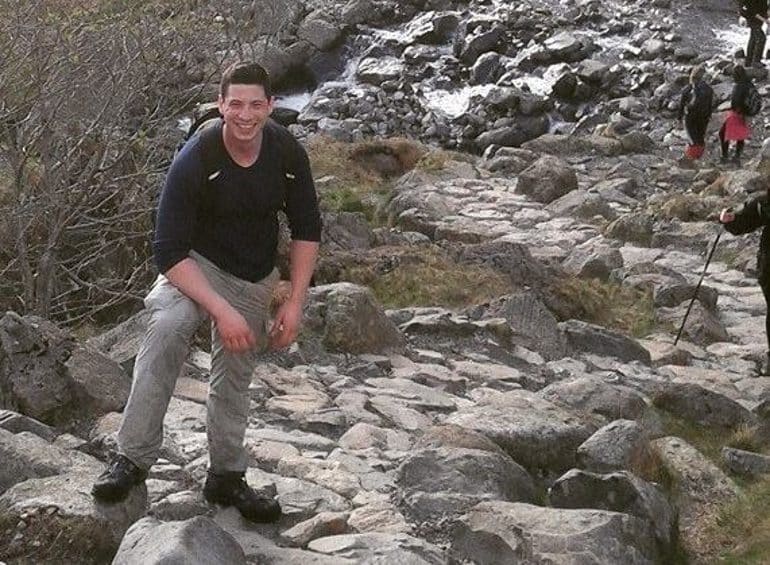Good in a crisis: Nicholas uses skills to help refugees

Old Elizabethan Nicholas Millet was pursuing a steady career as a successful management consultant – but all that changed when he went on a visit to the Jungle refugee camp at Calais.
He only planned to help for the weekend, but was so struck by the plight of the refugees that the very next day Nicholas (OE 2001–2008) flew to Chios. This Greek island was the arrival point for the highest number of refugees after Lesbos, with up to 1,500 making the journey across the Aegean Sea every night.
He told the Jewish Chronicle: “I was seeing people make these dangerous and perilous journeys on the news, and I just felt I had to be on the right side of history. I couldn’t help looking at the refugees in Calais and thinking this was my family 70 years ago when we were fleeing the Nazis.”
Having negotiated a leave of absence from his employer, he went on to lead a group of some 60 volunteers on Chios helping to ensure the safety of the desperate people crossing the sea in dinghies and rubber boats. With babies, women, children, the disabled and the sick all crammed together on their journey, it was, said Nicholas “impossible to see them coming off the boats soaking wet and not feel compelled to help them. With my managerial experience, I knew I had a strong skill set that could help.”
The European Union-Turkey deal in March 2016 brought a halt to such border crossings into the EU, but many of the refugees remained stranded on the island, where the Greek government refused to integrate the refugee children into the state school system.
Deeply shocked by this infringement of their rights and by the wider failure of Europe to resettle refugees, Nicholas gave up his job with multinational consulting company, Capgemini, and in the same month, May 2016, he and other volunteers working with a Switzerland-based organisation called Be Aware and Share (BAAS) set up Refugee Education Chios. This non-profit organisation has since established two schools – a primary and a secondary – and a youth centre, run by a team of 30 volunteers. The schools have helped educate more than 800 children and young people aged 6-22.
Nicholas, of Stanmore, has a history of involvement in humanitarian projects. Shortly after leaving QE, he spent time at the Sri Sathya Sai School – a village school in Kerala, India, which QE has supported since 2002. And, while he was a student at Cambridge, he did some work as a researcher for the Grameen Bank, the Nobel Prize-winning microfinance organisation based in Bangladesh which works to help the poor.
At Cambridge, Nicholas read for the Politics, Psychology and Sociology Tripos. He co-founded and became president of the Cambridge Global Zero Chapter – Global Zero is an international campaign working towards the elimination of nuclear weapons. He was also a guest liaison officer for the Cambridge Union and was elected social steward of Fitzwilliam College Junior Members’ Association (the student body).
After graduating, he took a number of short-term roles, before in September 2013 he became an Associate Consultant for Capgemini, one of the world’s leading providers of consulting, technology and outsourcing services, with more than 180,000 employees in over 40 countries. In September 2015, Nicholas was promoted to become a Consultant; he worked with clients including Government departments and a British multinational retailer.
Nicholas recently visited QE to talk to boys about his humanitarian work. The talk was organised by Year 13 pupil Ché Applewhaite under the auspices of the School’s Forward Thinking Society.
Often, he explained, as a result of the wars in Syria, Iraq and Afghanistan, children entering the schools on Chios have received little formal education. The schools therefore use a unique, innovative curriculum that pays special attention to refugee children’s needs. There are English, mathematics and arts lessons, together with vocational courses, including business and public speaking.
At the schools and youth centre, the children can talk openly about their experiences. Prejudices about different nationalities and races are actively challenged, as the schools aim to provide a supportive environment where all children can retain dignity and hope. The schools are also now the largest provider of child protection services on the island. The youth centre offers a kitchen so that the young people can cook their native cuisine: before it was established, there were no cooking facilities in the refugee camps.
While established NGOs would have taken six or seven months to set up a similar project, the schools and youth centre were set up very quickly indeed – for this, Nicholas credits the crucial problem-solving and leadership skills that he gained from his experience in management consultancy. However, he also emphasised that a committed attitude was the greatest asset among the volunteers on the island.
The Chios schools have attracted coverage from major news websites and Nicholas has spoken at universities, to the European Commission and with senior EU officials on panels dealing with refugee policy.
He currently plans to stay in Chios for an indefinite period to run the schools.
Thanking him for his visit, Head of Geography Emily Parry said the boys were very grateful for the thorough understanding of the refugee crisis Nicholas had provided.
